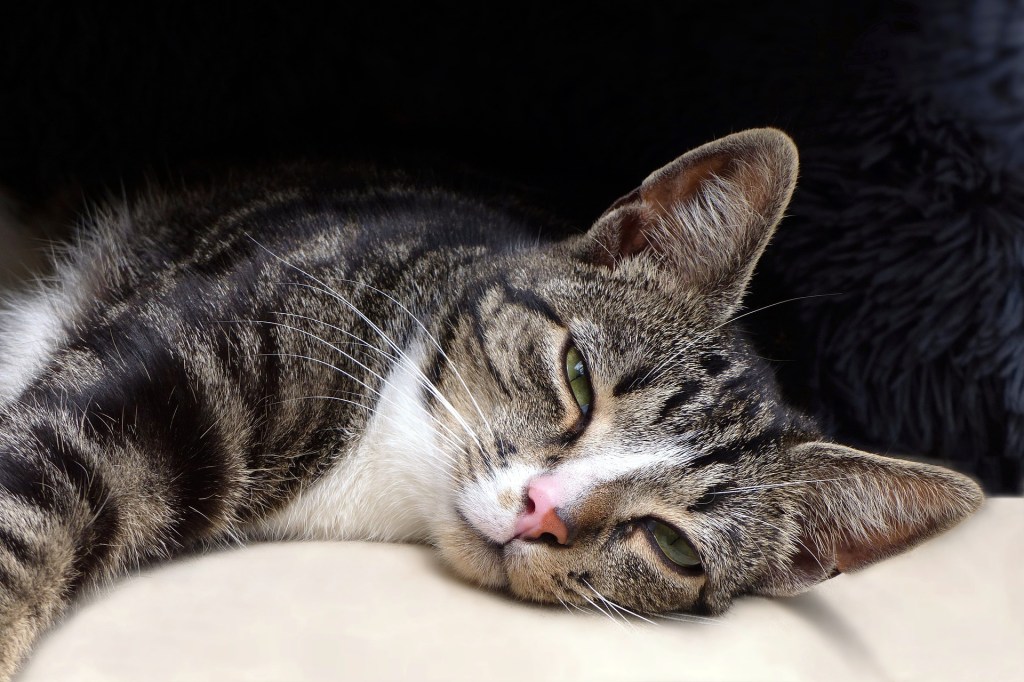If your favorite feline is suffering from a fever, how can you tell? When humans have a fever, it’s pretty self-evident. We don’t want to eat, we want to curl up on the couch, and we might experience chills and sweats. While cats don’t have quite the same symptoms, there are several ways that you can tell if your cat is feverish.
Hopefully, your feline friend is healthy most of the time and you don’t have to worry about this too much, but knowing how to tell if your cat has a fever can help you to identify if he needs some extra care and possibly even a trip to the vet. A fever can be a sign of an underlying condition like a virus or injury, so being able to recognize it is an important part of caring for your cat.

How do cats act when they have a fever?
According to Carolina Veterinary Specialists Greensboro, cats who have a fever may act abnormally. You might notice that your cat has little or no appetite, and he may be less active than usual. Your cat might appear weak or lethargic, and he might shiver. He might drink less, vomit, or have diarrhea. Your cat may become dehydrated and might not groom himself as well as he usually does.
Can I tell if my cat has a fever by touch?
According to Bishop Ranch Veterinary Center & Urgent Care, you might notice that your feverish cat’s stomach and underarms are warmer than usual. This can be difficult to do, though, unless there’s a significant heat difference and you’re very familiar with your cat’s normal temperature in these areas.
Keep in mind that this isn’t a reliable way of detecting a fever in your cat. The symptoms listed above are more indicative of fever, but the only true way to validate that your cat is feverish is to take his temperature.
Does my cat have a fever if his ears are hot?
Bishop Ranch Veterinary Center & Urgent Care explains that hot ears don’t necessarily indicate a fever. Your cat’s ears’ temperature fluctuates based on his surroundings, and since the ears are exposed and not covered by fur, these temperature changes are more noticeable.
If you do notice that your cat’s ears are hot, then it’s best to take his temperature with a thermometer to get the most accurate idea of whether he’s feverish.

How do you take a cat’s temperature?
According to VCA Hospitals, you can take your cat’s temperature with either a digital or rectal thermometer, and you can take the temperature through his rectum or ear. In both instances, it’s helpful to have someone who can hold your cat while you take his temperature.
If you’re taking your cat’s temperature rectally, he’ll likely try to sit on the thermometer as you insert it. It can help to lay your cat on his side first, then gently insert the thermometer about an inch. If you’re using a glass thermometer, then you’ll need to hold it in place for two minutes. Digital thermometers are usually easier since you just need to hold them in place until they beep.
If you’re taking your cat’s temperature aurally, you’ll need to insert the thermometer gently into his ear canal. To do this, hold it at a right angle with your cat’s head. Don’t try to force the thermometer. Hold it in place until it beeps.
Your cat’s normal body temperature is 101.0 to 102.5 degrees Fahrenheit. If his temperature is above that range, he has a fever. To get the most accurate reading, only take your cat’s temperature when he is calm and quiet.
Carolina Veterinary Specialists Greensboro recommends that if your cat has a fever, you should make sure he has access to water, so he stays hydrated. Don’t give your cat any human medication, since some medications, like acetaminophen, are toxic to cats.
Final thoughts on fever in cats
If your cat’s fever lasts for more than 24 hours, or if he develops a fever of 106 degrees Fahrenheit or higher, take him to the local emergency clinic or take him in to see your vet. There are many potential causes of fevers in cats, including injuries, medications, diseases, and infections. It’s important that your cat receives the treatment necessary to not only control a high fever but to also identify and treat its root cause. Your vet might advise you to monitor a low-grade fever, but it’s always best to reach out to your vet for advice to make sure you’re doing the right thing for your cat.
Editors' Recommendations
- Wondering why cats chirp? Fascinating reasons why your cat chirps at birds (and you)
- How to tell if your cat is a Maine Coon mix (and why you should care)
- Your cat trilling is actually a good thing – here’s why
- Is your cat hissing and growling a lot? These 5 tips will work wonders on your feline friend
- The kind of nutty behavior to expect if you don’t neuter your cat



